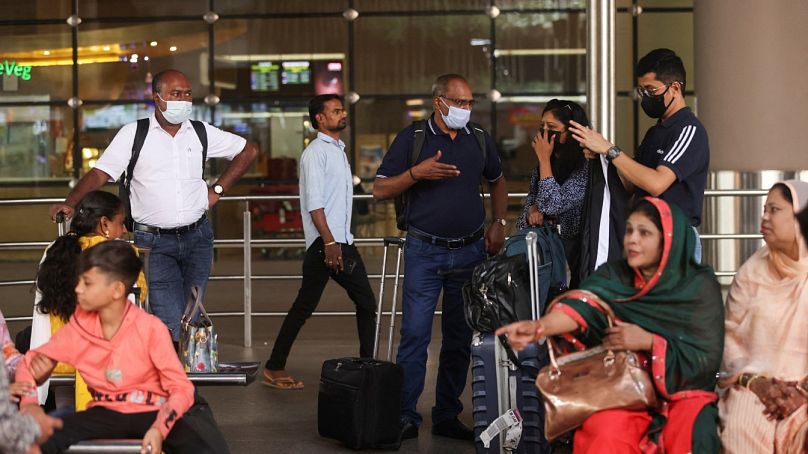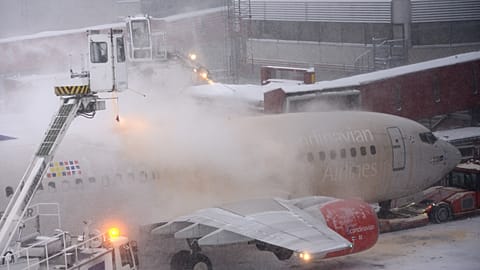US officials cited the "lack of transparent data" coming from Beijing as the reason for the new COVID-19 measures.
Countries are imposing new COVID-19 measures on travellers coming from China as international travel resumes.
In the EU, Cyprus, France, Germany, Greece, Italy, Latvia, the Netherlands, Portugal, Spain and Sweden have so far stepped up rules on travellers from China in response to rising cases.
While EU countries have so far failed to agree on a coordinated approach to the changing COVID-19 situation, the bloc has 'strongly' encouraged a pre-departure test requirement. Other recommended measures for flights arriving in the EU from China include wearing a mask onboard flights, enhanced cleaning of aircraft, vaccination of crew members, random testing of arrivals, sequencing of positive tests, and waste water monitoring at airports to detect infection levels and new variants.
Which European countries have introduced COVID-19 requirements on travel from China?
Italy was the first EU country to tighten restrictions, ordering COVID-19 antigen swabs and virus sequencing for all travellers coming from China, the health minister announced last month.
Spain became the second European country to announce COVID restrictions on travellers from China, who will now need to provide a negative test result or proof of vaccination.
After initially saying it was unnecessary to increase border controls, France has announced it will require a negative PCR or antigen test taken less than 48 hours before boarding for all travellers coming from China as of 5 January. Sweden, too, has now announced it will require negative tests for travellers incoming from China as of 7 January and the Netherlands from 10 January.
The Belgian mayor has also called for COVID checks to be reintroduced on tourists entering from China. The government announced on Monday that it will test wastewater from planes arriving from China for new COVID variants as part of new steps against the spread of the coronavirus.
Cyprus will begin requiring negative tests from passengers arriving from China as of 15 January.
The UK has U-turned on its original statement that it has no plans to bring back COVID-19 testing for those arriving from China. As of 5 January, it will require a pre-departure negative COVID-19 test, the Department of Health said on Friday.
China has clapped back at the targeted entry restrictions saying they lack scientific basis and are unreasonable. Mao Ning, a spokesperson for the Chinese foreign ministry, said on Tuesday that the country is "firmly opposed to such practices" and threatened retaliation.
Which other countries have introduced COVID restrictions for arrivals from China?
Elsewhere, Australia, Canada, India, Israel, Malaysia, Morocco, Qatar, South Korea, Taiwan and the USA have introduced additional COVID measures for arrivals from China.
After originally saying it would not reintroduce testing, Australia has announced that travellers arriving from China will need to submit a negative COVID-19 test taken within 48 hours of departure as of 5 January.
Air travellers to Canada from China must test negative for COVID-19 no more than two days before departure, Ottawa said.
India has mandated a COVID-19 negative test report for travellers arriving from China, Hong Kong, Japan, South Korea, Singapore and Thailand. Passengers from those countries will be quarantined if they show symptoms or test positive.
India detected a total of 11 new variants of COVID-19 in international travellers who arrived in the country between 24 December 24 and 3 January, health ministry sources say. Of the 19,227 passengers who were tested for COVID-19 during the period, 124 were found positive.
Israel's newly appointed Health Minister Aryeh Deri has announced new COVID-19 testing requirements for travellers from China, according to the Times of Israel.
Malaysia has put in place additional tracking and surveillance measures. It will screen all inbound travellers for fever and test wastewater from aircraft arriving from China for COVID-19.
Morocco will impose a ban on people arriving from China of all nationalities from 3 January.
Qatar will require travellers arriving from China from 3 January to provide a negative COVID-19 test result taken within 48 hours of departure, state news agency QNA said.
Japan requires a negative COVID-19 test taken within 72 hours of departure for travellers from China. The country is also now testing passengers on arrival, with those testing positive having to undergo a week in quarantine. Tokyo also plans to limit airlines increasing flights to China.
South Korea has introduced on-arrival PCR tests for people coming from China. From 5 January, the country will additionally require a negative test result within 48 hours or a rapid antigen test taken within 24 hours before departure. Restrictions are also being placed on short-term visas for Chinese nationals.
On-arrival PCR testing has been introduced for all passengers on direct flights from China to Taiwan, as well as by boat at two offshore islands.
The Philippines is also considering imposing tests and has heightened surveillance on symptomatic passengers coming from China.
Southeast Asian nations are treating Chinese travellers like any others.
Thailand requires foreigners whose next destination is a country requiring a negative pre-entry COVID-19 test - which includes China - to show they have health insurance covering treatment for the disease.
Both Malaysia and Thailand are testing airline wastewater for the virus.
US government officials are ramping up controls, too, citing concerns about the "lack of transparent data" coming from Beijing. Beginning on 5 January, all air passengers two years old and older will require a negative result from a test no more than two days before departure from China, Hong Kong or Macao.
Why are countries concerned about travellers incoming from China?
Over the past few weeks, China has rapidly been loosening its strict COVID rules amid citizen unrest. The abrupt policy change has reportedly left its health system overwhelmed as the virus spreads largely unchecked.
China, a country of 1.4 billion people, reported three new COVID-related deaths for Tuesday, up from one for Monday. However, these numbers are inconsistent with what funeral parlours are reporting, as well as with the experience of much less populous countries after they re-opened.
"There are mounting concerns in the international community on the ongoing COVID-19 surges in China and the lack of transparent data, including viral genomic sequence data, being reported from the PRC [People's Republic of China]," US officials said in December.
In Italy, Milan's main airport, Malpensa, had already started testing passengers arriving from Beijing and Shanghai on 26 December, and the results showed almost one in two passengers was infected.
What are the rules for people travelling into China?
China said in December it will lift its quarantine requirement for inbound travellers starting from 8 January. A negative PCR test is still required. It will also resume issuing visas for residents to travel overseas.
This is a major step towards easing curbs on its borders, which have been largely shut since 2020. The rules have gradually been easing in recent weeks to facilitate both domestic and international travel.
Hong Kong also said it will scrap most of its remaining COVID restrictions.
Online searches for flights out of China spiked in December from extremely low levels, but residents and travel agencies suggested a return to anything like normal would take some months yet, as caution prevails for now.



















